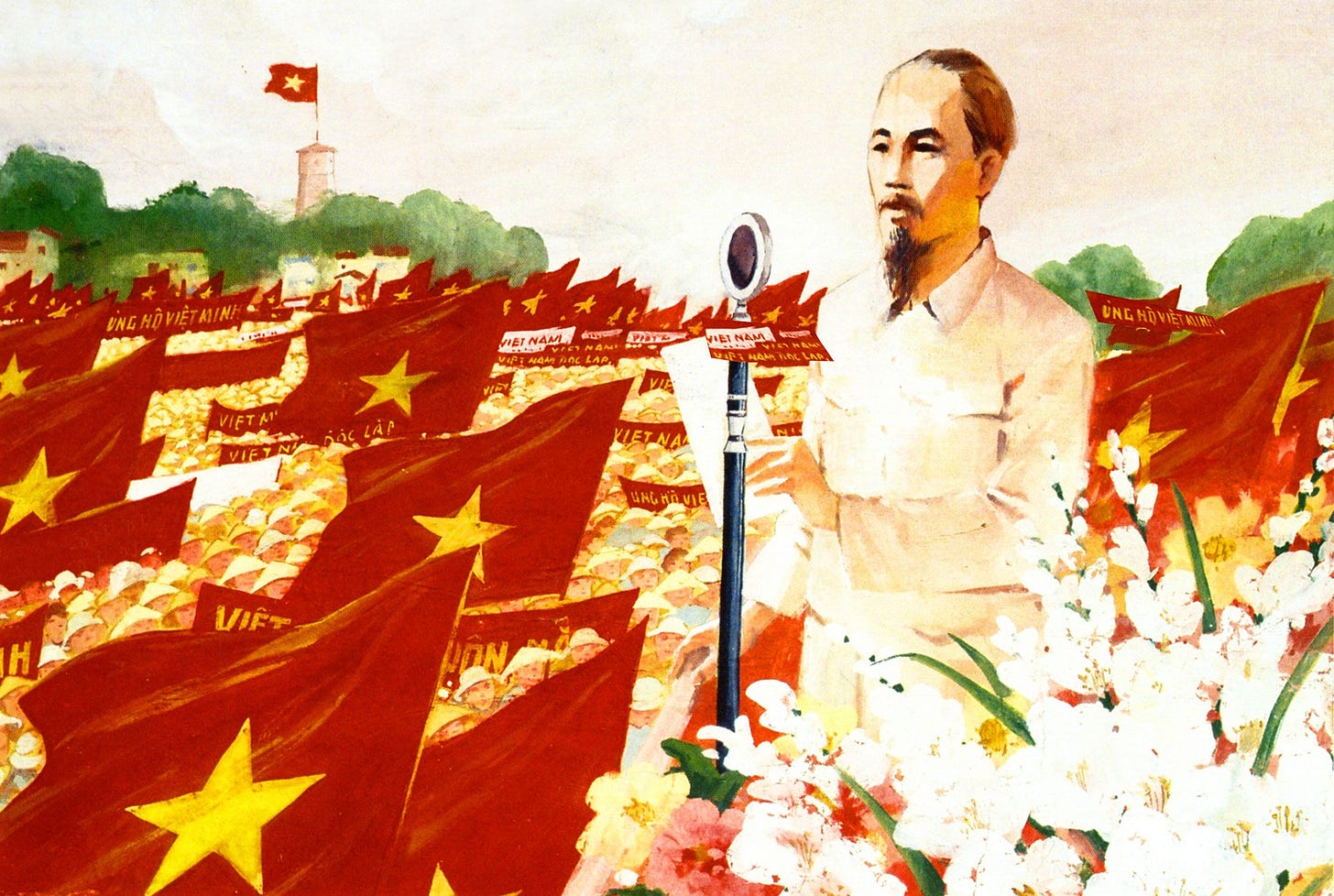On This Day 1945, Ho Chi Minh Declares Independence
The West had a chance to back freedom in Vietnam. Instead, it clung to empire and fear, and millions paid the price.
The Declaration the World Ignored
On 2 September 1945, Ho Chi Minh stood before a crowd of hundreds of thousands in Ba Dinh Square, Hanoi. With a borrowed microphone and words lifted from the American Declaration of Independence, he proclaimed the birth of a new nation, the Democratic Republic of Vietnam.
It was a defining moment, not only for Vietnam, but for the post-war world. Here was a leader, shaped by global ideologies, declaring freedom from colonial rule at the very hour Europe was rebuilding itself on the ruins of fascism. But rather than listen, the West turned away. Worse still, it turned against him.
Ho Chi Minh asked for recognition. What he got was betrayal, bullets and bombs.
Ho Chi Minh’s Revolution Was Not Just Communist, It Was Anti-Colonial
To reduce Ho Chi Minh’s movement to communism alone is to miss the deeper wound. Vietnam had spent six decades under French exploitation, where forced labour, famine and racial subjugation were policy, not accident. Then came the Japanese during the Second World War, tightening the chokehold while two million Vietnamese starved to death in one of the least discussed atrocities of the 20th century.
Ho Chi Minh called it the “double yoke”. And when that yoke broke, first with Japan's collapse and then with France’s fleeting absence, the Vietnamese saw daylight. Ho was no puppet of Moscow or Beijing. He was a patriot who had studied Marx as seriously as he had admired Jefferson. His declaration was as much an act of pragmatism as it was of ideology. It was rooted in the belief that if America, born of revolution, could throw off an empire, Vietnam had that same right.
But the West did not see a man fighting for liberation. They saw another Red.
The Missed Opportunity That Led to Three Decades of War
Had the United States backed Vietnam’s call for independence, the entire trajectory of Southeast Asia might have changed. There was a window, brief, real and now lost to history, when America could have been the model, not the enemy.
Instead, Washington backed France. Not just with words but with money, weapons and advisers. All in the name of stopping communism’s spread. The irony is sharp enough to cut steel, the land that declared “all men are created equal” chose colonial loyalty over principle. And in doing so, it sowed the seeds of its own defeat.
By the time the French suffered their crushing loss at Dien Bien Phu in 1954, the pattern was clear. Colonial powers would not hold Vietnam. But rather than learn the lesson, America decided to replace France. It dressed up its intervention in the language of democracy, but Vietnamese farmers still saw foreign tanks rolling across their rice fields.
Independence Denied, Then Earned the Hard Way
Ho Chi Minh died in 1969, before he could see the end of the war he started and never wanted to fight. For all his flaws, and there were many, he was unwavering in his goal, a united, independent Vietnam. He died knowing his country was once again under foreign assault, this time not from Paris but from Washington. More bombs were dropped on Vietnam than on all of Europe during the Second World War. Villages were flattened, children burned, forests poisoned.
The cost of the West’s decision not to listen to Ho Chi Minh in 1945 was paid in blood by generations of Vietnamese.
Yet, they endured. They resisted. And in 1975, with the fall of Saigon and the raising of the Viet Minh flag over the Presidential Palace, Vietnam finally won the independence that had been declared three decades earlier. Not granted by diplomacy, but wrestled through war. A war that could have been avoided if the world had taken Ho Chi Minh at his word.
Legacy of a Silenced Declaration
We like to believe history bends toward justice. That truth eventually wins. But Vietnam’s journey shows that justice must be fought for, often in the face of overwhelming hypocrisy. Ho Chi Minh quoted America’s founding principles not to flatter, but to remind. And the world’s silence in 1945 was not just political, it was moral.
Today, we look back at Vietnam through the fog of war films and Cold War rhetoric. But on this day, we must remember what started it all. A man, a square, a microphone, and a cry for freedom that was ignored.
Vietnam’s history is not just a story of war. It is a story of patience, sacrifice and a stubborn refusal to stay colonised. And it all began, on 2 September 1945, with words that should have echoed differently:
“All men are created equal. They are endowed by their creator with certain inalienable rights…”
The world had a chance to listen. Instead, it chose to occupy, manipulate and divide. And so Vietnam bled for thirty years to win what it had already declared, independence.


